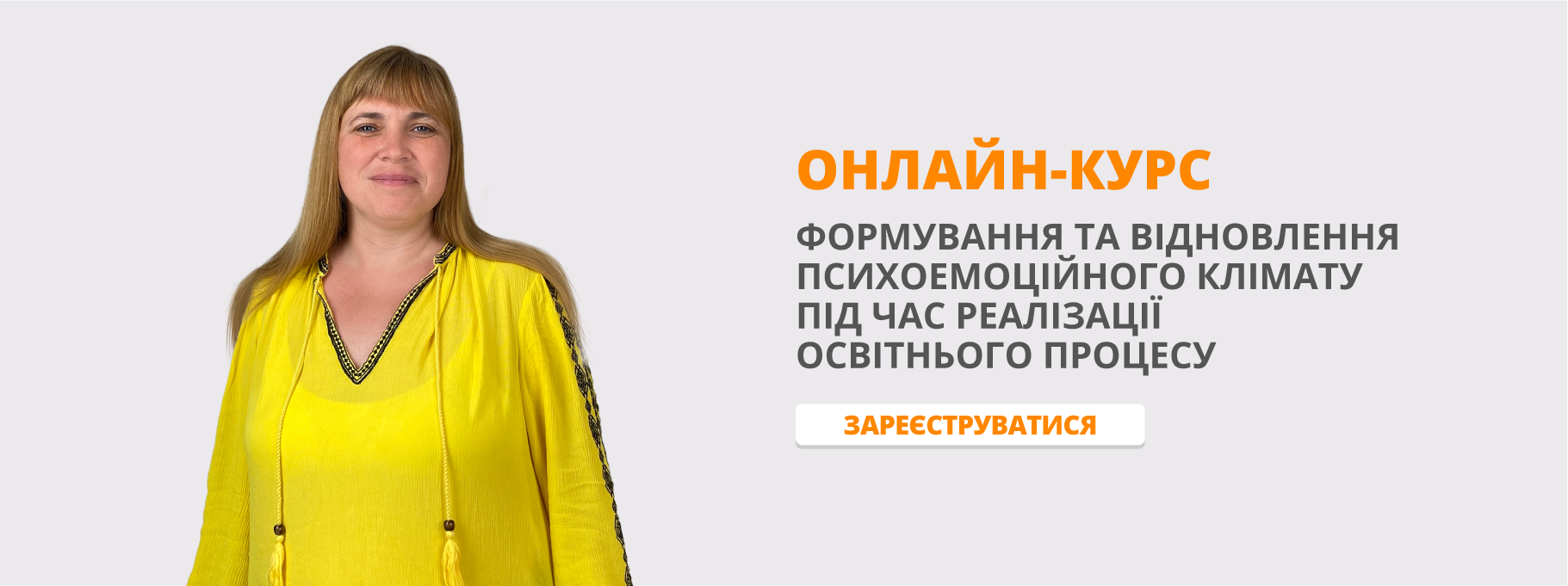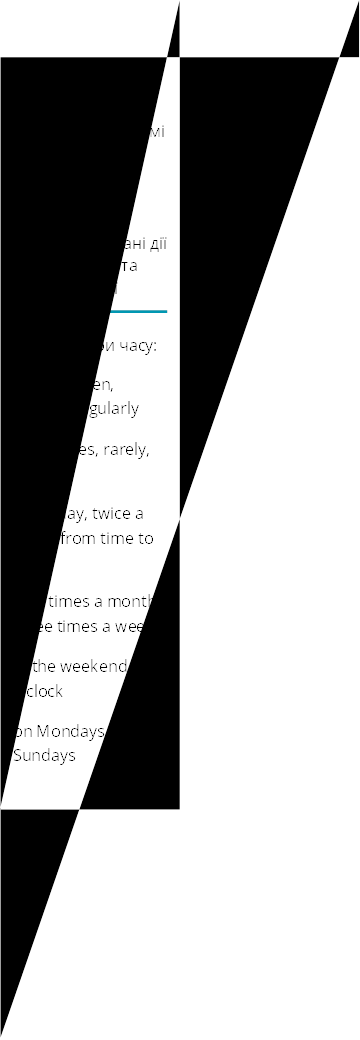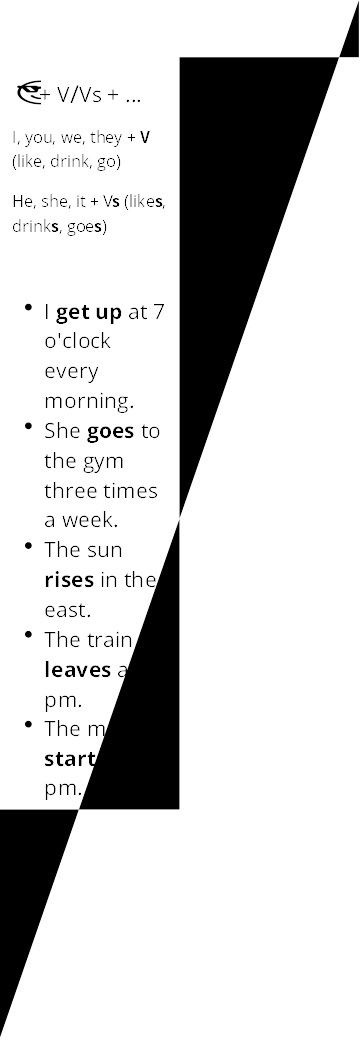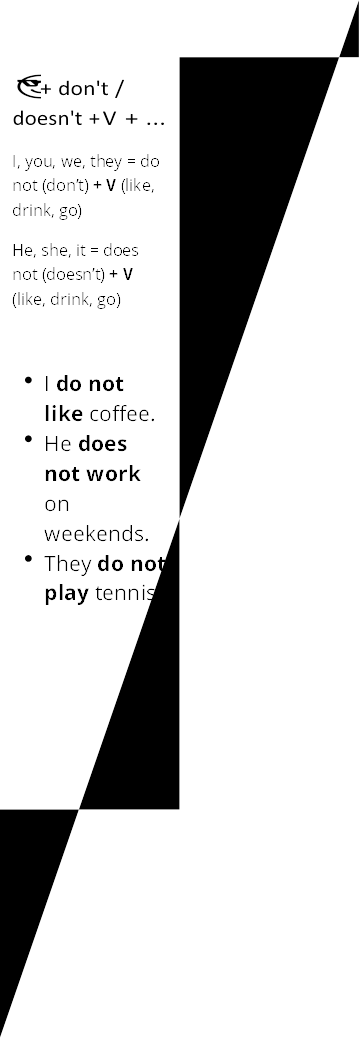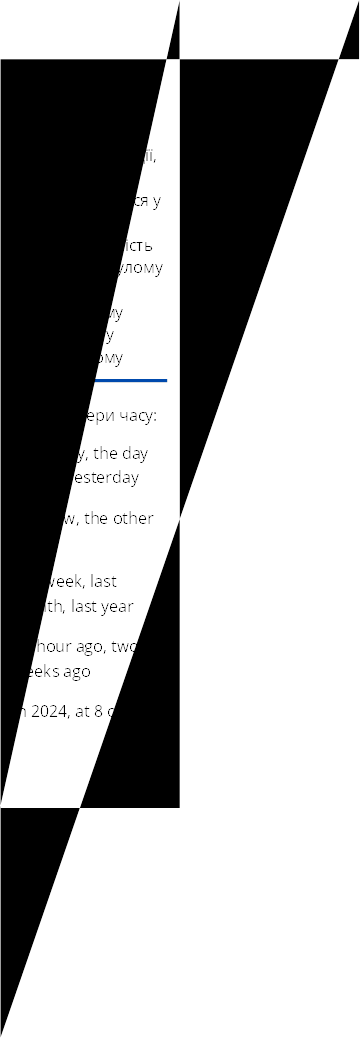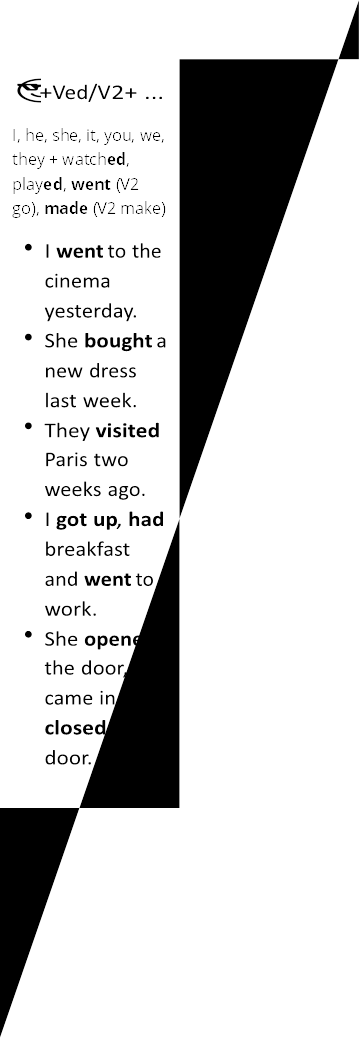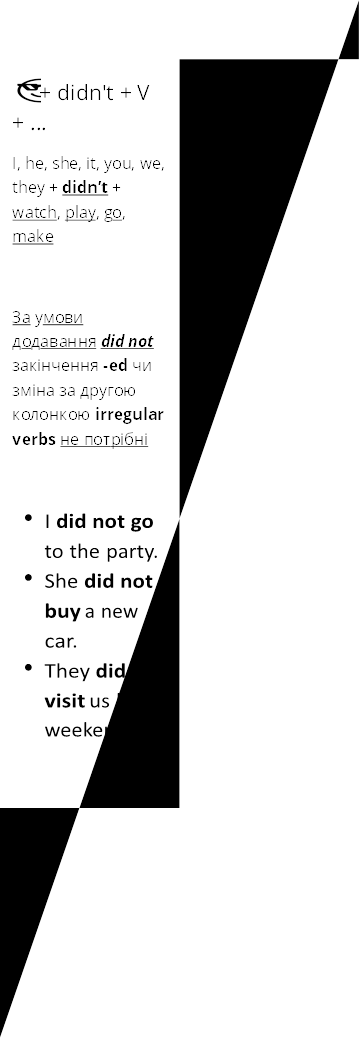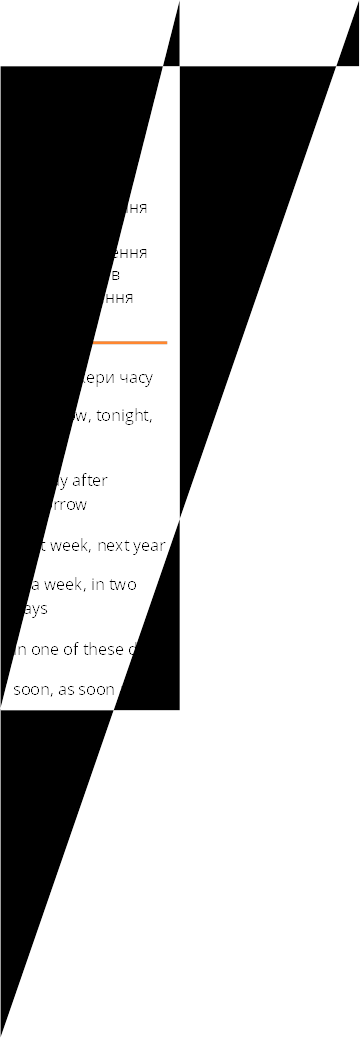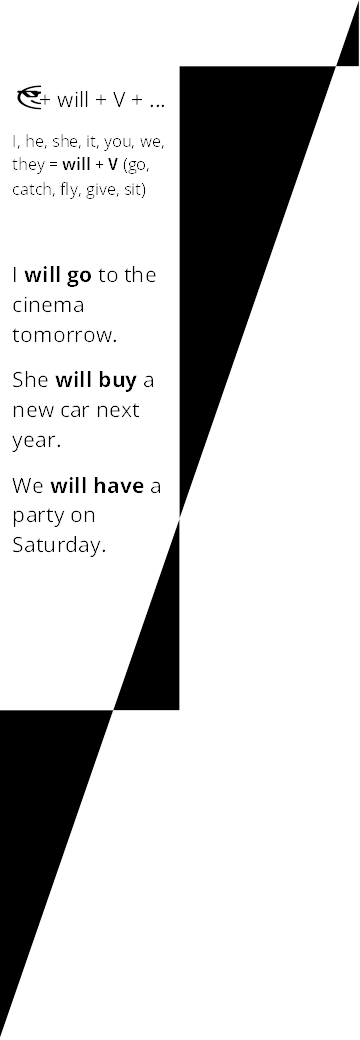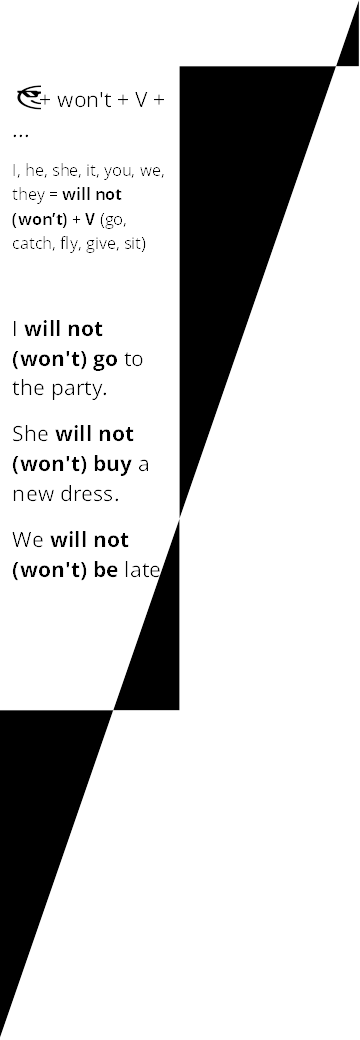Таблиця всіх часів англійської мови "English tenses"
 English tenses
English tenses
Основні часи в англійській мові
Англійська мова має три основних часи:
![]() Present (Теперішній) - дії, що відбуваються зараз, регулярно або в загальному сенсі.
Present (Теперішній) - дії, що відбуваються зараз, регулярно або в загальному сенсі.
Past (Минулий) - дії, які вже відбулися.
Future (Майбутній) - дії, які відбудуться.
Додаткові аспекти
Кожен з цих основних часів має додаткові аспекти, які уточнюють характер дії:
![]() Simple (Простий) - фокусується на факті дії.
Simple (Простий) - фокусується на факті дії.
Continuous (Тривалий) - підкреслює тривалість дії в певний момент часу.
Perfect (Доконаний) - вказує на завершеність (доконаність) дії до певного моменту. Perfect Continuous (Доконано-тривалий) - поєднує в собі значення завершеного (доконаного) та тривалого аспектів.
Перед тим, як перейти до конкретних часів, розглянемо загальну структуру англійського речення:
![]() Affirmative (Стверджувальне): Підмет + дієслово + доповнення
Affirmative (Стверджувальне): Підмет + дієслово + доповнення
Negative (Негативне): Підмет + допоміжне дієслово + not + основне дієслово + доповнення
Questions (Питальне): Допоміжне дієслово + підмет + основне дієслово + доповнення?
Допоміжні дієслова - це дієслова, які допомагають утворювати різні часи і конструкції. Найчастіше використовуються дієслова to be (am, is, are), have (has, have), do (does, did) та модальні дієслова (can, could, will, would тощо).
Умовні позначки до таблиці
|
😎(subject) V (verb) Vs Ving V2 V3 Ved |
Особа або предмет дії, підмет (іменник); дієслово в інфінітиві (початковій формі): для англійської це дієслова по типу to be - бути (to play - грати, to speak - говорити, to take - брати), АЛЕ, входячи до граматичної часової конструкції речення вживається без частки to; дієслово з закінченням -s або -es (ознака Present Simple); дієслово з закінченням -ing (підкреслює тривалість дії, ознака Continuous); дієслово, змінене за другою колонкою спеціальної таблиці irregular verbs (неправильних дієслів), (ознака Past Simple); дієслово, змінене за третьою колонкою спеціальної таблиці irregular verbs (неправильних дієслів), (вказує на завершеність (доконаність) дії, ознака Perfect); дієслово з закінченням -ed (вживається замість V2 та V3 у випадках, коли дієслова є правильними (reggular verbs), тобто всі, що НЕ ввійшли до переліку нерегулярних (irregular verbs), їх треба вивчити, запам’ятати). |
|
|
A rmative |
Negative |
Questions |
|
|
|
|
|
|
Present Continuous відбуваються прямо зараз |
😎 + am/is/are + Ving + ... I = am + Ving (playing) He, she, it = is + Ving (reading) |
😎 + am not/isn't/aren't + Ving + ... I = am not + Ving (playing) He, she, it = is not |
Am/Is/Are + 😎 + Ving + ... ? Am = I + Ving (playing) ? Is = he, she, it + Ving (reading) ? |
|
відбуваються зараз
now, right now, still at the moment this morning, this afternoon today, tonight, these days, nowadays |
You, we, they = are + Ving (swimming)
|
(isn’t) + Ving (reading) You, we, they = are not (aren’t) + Ving (swimming) ?
|
Are = you, we, they + Ving (swimming) ?
|
|
|
|
moment |
|
|
|
|
|
|
|
times this week, this afternoon for an hour, for a long time |
The weather has changed a lot. |
They haven't been to the cinema for a long time. |
project? |
|
|
|
|
|
|
|
A rmative |
Negative |
Questions |
|
|
|
|
|
|
Past Continuous
які були перервані іншою дією |
😎 + was/were + Ving + ... I, he, she, it = was + Ving (playing, singing, making) You, we, they = were + Ving (playing, |
😎 + wasn't/weren't + Ving+ ... I, he, she, it = wasn’t + Ving (playing, singing, making) |
Was/Were + 😎 + Ving + ... ? Was = I, he, she, it + Ving (playing, singing, making) ? Were = you, we, they + Ving (playing, |
|
|
|
|
|
|
at the same time Past Perfect
до іншої дії в минулому
з after, when, before
|
😎 + had + Ved/V3 + ... I, you, we, they, he, she, it = had + Ved (smiled, climbed) / V3 (begun, spoken, met) I had finished my homework before I went to bed. She had already eaten when I arrived. |
😎 + hadn't + Ved/V3 + ... I, you, we, they, he, she, it = hadn’t + Ved (smiled, climbed) / V3 (begun, spoken, met) I hadn't seen him before that day. She hadn't finished her project by the deadline. |
Had+ 😎 + Ved/V3 + ... ? Had = I, you, we, they, he, she, it + Ved (smiled, climbed) / V3 (begun, spoken, met) ? Had you finished your work? Had she been to London before? Had they left the party when |
|
before, before the moment no sooner… than, by two o’clock, by half past six by that time, by evening |
They had lived in Paris for five years before they moved to New York. |
They hadn't eaten dinner before they went to the party. |
you arrived? |
|
|
😎 + had + been + Ving + ... I, you, we, they, he, she, it = had been + Ving (smiling, climbing, beginning, speaking, meeting)
She had been waiting for an hour when he finally arrived. They had been living in that house for ten years before they sold it. |
|
|
|
|
A rmative |
Negative |
Questions |
|
|
|
|
|
|
Future Continuous
продовжувати меться протягом |
😎 + will + be + Ving + ... I, he, she, it, you, we, they = will be + Ving (going, catching, flying, giving, sitting) I will be working at 5 |
😎 + won't + be + Ving + ... I, he, she, it, you, we, they = will not (won’t) be + Ving (going, catching, flying, giving, sitting) I will not be working at 5 |
Will + 😎 + be + Ving + ... ? Will = I, he, she, it, you, we, they + be + Ving (going, catching, flying, giving, sitting) ? Will you be working at 5 |
|
|
|
|
|
|
Future Perfect
дії
before, till, until by then, by the time |
😎 + will + have + Ved/V3 + ... I, you, we, they, he, she, it = will have + Ved (liked, called) / V3 (taken, hidden, kept) I will have finished my work by 5 o'clock. She will have bought a new car by next year. |
😎 + won't + have + Ved/V3 + ... I, you, we, they, he, she, it = will not (won’t) have + Ved (liked, called) / V3 (taken, hidden, kept) I will not have finished my work by 5 o'clock. She will not have bought a |
Will + 😎 + have + Ved/V3 + ... ? Will = I, you, we, they, he, she, it + have + Ved (liked, called) / V3 (taken, hidden, kept) ? Will you have finished your homework by tomorrow? Will she have arrived by the time the party starts? |
|
by 3 p.m, by 5 o’clock by tomorrow, by next week |
They will have traveled to many countries by the time they retire. |
new car by next year. They will not have traveled to many countries by the time they |
Will they have left by the time we get there? |
|
|
|
i |
|
|
|
😎 + will + have + been + Ving + ... I, you, we, they, he, she, it = will have been + Ving (liking, calling, taking, hiding, keeping) By next year, I will have been studying English for 5 years. By the time she arrives, they will have been waiting for her for two hours.
|
😎+ won't + have + been + Ving + ... I, you, we, they, he, she, it = will not (won’t) have been + Ving (liking, calling, taking, hiding, keeping) By next week, I will not have been working on this report for a week.
By the end of the month, she will not have |
Will + 😎 + have + been + Ving + ... ? Will = I, you, we, they, he, she, it + have been + Ving (liking, calling, taking, hiding, keeping) ? Will you have been living in this city for 10 years by next year?
Will she have been teaching for 30 years? |
|
|
|
been working on this project |
|
for a month

про публікацію авторської розробки
Додати розробку
